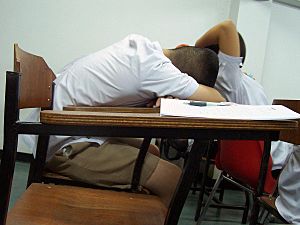Fatigue facts for kids
Fatigue or tiredness is a common feeling that makes you want to sleep or rest. It can be a physical feeling, like when your body is worn out, or a mental feeling, like when your brain is tired from thinking too much. When you feel fatigued, you might feel weak, slow, or very sleepy. You might also yawn a lot and find it hard to keep your eyes open. Usually, this kind of tiredness goes away after you rest or get enough sleep.
Contents
What Causes Fatigue?
Fatigue can happen for many reasons. Sometimes it's just because you've been very active, like playing sports all day, or because you haven't slept enough. But other times, it can be a sign of something else.
Everyday Causes of Tiredness
Most of the time, feeling tired is normal and not serious. Here are some common reasons:
- Lack of sleep: Not getting enough sleep is the biggest reason people feel tired. Your body and brain need sleep to recover and get ready for the next day.
- Lots of physical activity: After a long day of sports, running, or playing, your muscles get tired. This is a normal kind of fatigue.
- Mental effort: Studying for a big test or spending hours on a challenging project can make your brain feel tired, even if your body isn't.
- Not eating well: If you don't eat enough healthy food, your body might not have the energy it needs, leading to tiredness.
- Stress or worry: When you are stressed or worried about things, it can use up a lot of your energy and make you feel tired.
- Boredom: Sometimes, doing something very boring can make you feel sleepy and tired.
Other Reasons for Feeling Fatigued
Sometimes, fatigue can be caused by other things that need more attention. These are less common for everyday tiredness but are important to know:
- Illnesses: Being sick, even with a common cold or flu, can make you feel very tired as your body fights off the illness. More serious illnesses can also cause long-lasting fatigue.
- Certain medicines: Some medicines can have side effects that make you feel sleepy or tired.
- Jet lag: When you travel across many time zones, your body's internal clock gets mixed up, which can cause fatigue.
- Not enough nutrients: If your body doesn't get enough important vitamins and minerals, like iron, it can lead to feeling very tired.
When to Talk to an Adult
Most of the time, fatigue is normal and goes away with rest. But if you feel tired all the time, even after resting, or if your tiredness is so bad that it stops you from doing your usual activities, it's a good idea to talk to a parent, guardian, or doctor. They can help figure out why you're feeling so tired and what can be done to help you feel better.
How to Beat Fatigue
There are many simple ways to help reduce tiredness and feel more energetic:
- Get enough sleep: Try to go to bed and wake up around the same time each day, even on weekends. Most kids your age need about 8-10 hours of sleep each night.
- Eat healthy foods: Make sure you eat balanced meals with lots of fruits, vegetables, and whole grains. These foods give your body steady energy.
- Stay active: Regular physical activity can actually boost your energy levels. Even a short walk can help you feel more awake.
- Drink water: Staying hydrated is important. Dehydration can make you feel tired.
- Manage stress: Find ways to relax and deal with stress, like talking to a friend, listening to music, or doing a hobby you enjoy.
- Take breaks: If you're studying or doing something mentally challenging, take short breaks to rest your brain.
See also
 In Spanish: Cansancio para niños
In Spanish: Cansancio para niños
 | Sharif Bey |
 | Hale Woodruff |
 | Richmond Barthé |
 | Purvis Young |


